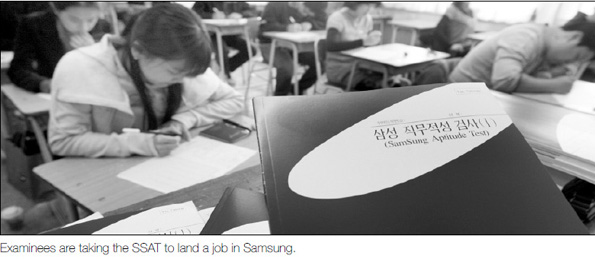
Last January 15th, Samsung changed the way to recruit new employees. Annually, about 200,000 examinees have crowded to take the SSAT, so it was criticized for making an employment private-education market. To lower the dependence on the SSAT, Samsung adopted the ‘University President Recommendation System’ and revived a document screening process for the first time in 19 years. The ‘University President Recommendation System’ is a system where presidents recommend talented students to Samsung, and those students can be exempted from the document process and then take the SSAT right away. However, Samsung entirely deferred the new employment system because of immediate social blame about the presidential recommendation system.
The most controversial problem in the system is that Samsung assigned a different number of recommendations to each university. It caused the controversy where the university recommendation system could make a rank of universities. Also, there were assertions about university discrimination from two sides. First, some people claimed Samsung is discriminating against women. Hanyang and Inha University, which are strong in Science and Engineering subjects, were assigned about 30~50 people more than other women’s universities, which are relatively weak in those subjects. Secondly, there is an argument that Samsung is discriminating regionally because Kyungpook and Busan National University, which are in the Yeongnam area, were assigned about 60 more people than Chonnam and Chonbuk National University, which are located in the Honam area.
The university expressed discontent about Samsung assigning the number of recommendations and argued that this is not fair. Even though each president recommends students, they are only exempted from the document process, so they still have to take the SSAT. Thus, the university president only has the chance to recommend students who receive good scores on simulation SSATs. Therefore, the universities are claiming that any real authority of the president is ignored. On the other hand, there is an opinion that Samsung’s new recommendation system should be highly praised in assigning recommendations to small local universities where students have difficulties landing a job in a big company.
The majority of students are opposed to the recommendation system. Im Sun-ha(23, Catholic University) said, “I’m concerned with how universities can recommend students in a fair way and I’m worried if the recommendations can be transparent.” Lee Seul(21, Chungbuk University) said, “I think universities in the capital area have more advantages and opportunities than local universities.” An Jae-young(21, Sungshin Women’s University) said, “Even though Samsung is strong in Science and Engineering subjects, women’s universities have been assigned about 100 fewer spots than other universities in Seoul. Compared with co-ed universities, we really obtained a lot fewer opportunities.”
Samsung expressed regret about the controversy concerning the new employment system. Furthermore, they showed the position that they are not discriminating against any particular university or region, but, because they are based in Science and Engineering, they need more people in those areas. Also, Science and Engineering majors are relatively small in number in women’s universities, so the assigned number of recommendations was small. It was not meant to discriminate against women, and Samsung said they will increase their present 30% female employee rate in the near future. However, last January 28th, Samsung finally decided to postpone the new employment system because of social blame, and they apologized to universities and students for causing confusion.
Then, how about CBNU? CBNU was assigned 30 recommendations from Samsung. The CBNU Human Resource Development Center said, “Chonbuk and Chungnam Universities also were assigned 30 recommendations, so if we compare that with general national universities, CBNU received a normal amount of opportunities. However, if we compare that with the universities in the Seoul area, CBNU has disadvantages.” Also, they said, “Besides, at least 10 people a year have joined Samsung from only the CBNU College of Electrical & Computer Engineering, so it is a disadvantage to us if we get just 30 recommendations for all colleges of CBNU.”
By Seo Yeo-ryung


 All
All Society & Global
Society & Global






 Seo Yeo-ryung
Seo Yeo-ryung











